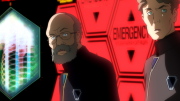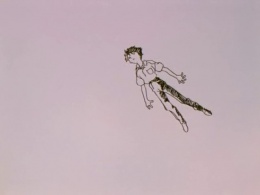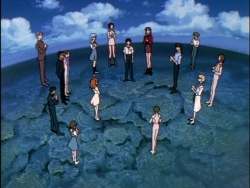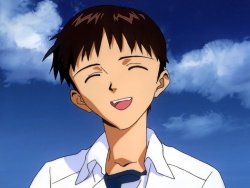Episode 26: Difference between revisions
mNo edit summary |
m (Very minor grammatical fix.) |
||
| Line 22: | Line 22: | ||
==Synopsis== | ==Synopsis== | ||
Instrumentality is still ongoing and [[Shinji Ikari]] is only one of billions of people undergoing the process. The event is viewed from his perspective. | Instrumentality is still ongoing and [[Shinji Ikari]] is only one of the billions of people undergoing the process. The event is viewed from his perspective. | ||
Shinji is confronted with the fear of ceasing to exist. But Shinji feels that this fear is not present in him, as he thinks that he might not need to exist, because he feels unwanted and useless. [[Misato Katsuragi]] tells Shinji that what he truly fears is failure. Failure to be loved, and of seeing how weak he is. He replies that Misato does the same thing, and she agrees. In fact, she and other characters say, it's true for all humanity, this weakness. It is why Instrumentality is taking place. Humans cannot live alone, but yet they are separate entities: thus conflict and pain are created. Humans cannot live but in Instrumentality. "Really?" asks the text. | Shinji is confronted with the fear of ceasing to exist. But Shinji feels that this fear is not present in him, as he thinks that he might not need to exist, because he feels unwanted and useless. [[Misato Katsuragi]] tells Shinji that what he truly fears is failure. Failure to be loved, and of seeing how weak he is. He replies that Misato does the same thing, and she agrees. In fact, she and other characters say, it's true for all humanity, this weakness. It is why Instrumentality is taking place. Humans cannot live alone, but yet they are separate entities: thus conflict and pain are created. Humans cannot live but in Instrumentality. "Really?" asks the text. | ||
Revision as of 19:19, 7 November 2019

|
"IT WASU WIDIN TI LEALM OF POSSIBIRITY" |
| Episode Information | |||||||
| Episode #26 | |||||||
| |||||||

| |||||||
| Written By | Hideaki Anno | ||||||
|---|---|---|---|---|---|---|---|
| Directed By | Kazuya Tsurumaki, Masayuki | ||||||
| First Aired | 3-27-1996 | ||||||
| Video Release Date | 9-9-1998 (Japan-Video/LD), 6-26-2001 (US-DVD) | ||||||
| Angel Appearances | None | ||||||
| Eva Sorties | None | ||||||
| Episode chronology | |||||||
| ← Previous | Next → | ||||||
| "Episode 25" | "(none)" | ||||||
Overview
Instrumentality continues. The focus is primarily on Shinji now, as he learns to accept the individual’s ability to shape their world, and how the self cannot exist without others to define it.
Synopsis
Instrumentality is still ongoing and Shinji Ikari is only one of the billions of people undergoing the process. The event is viewed from his perspective.
Shinji is confronted with the fear of ceasing to exist. But Shinji feels that this fear is not present in him, as he thinks that he might not need to exist, because he feels unwanted and useless. Misato Katsuragi tells Shinji that what he truly fears is failure. Failure to be loved, and of seeing how weak he is. He replies that Misato does the same thing, and she agrees. In fact, she and other characters say, it's true for all humanity, this weakness. It is why Instrumentality is taking place. Humans cannot live alone, but yet they are separate entities: thus conflict and pain are created. Humans cannot live but in Instrumentality. "Really?" asks the text.
The questions, posed by Rei Ayanami: What are you alive for? Who are you living for? Are you happy being alive? Asuka Langley Soryu thinks it is for herself, and says that she is happy. Misato only wants to do what she enjoys. But Shinji is unsure of all these things. Ryoji Kaji's voice asks: "Do you hate feeling lonely? Do you hate suffering?" Shinji does. So does Misato. "So is that why you run away?" Kaji asks Misato. Misato answers in affirmative, asking what is wrong with running away from pain?
But, Shinji says, "I mustn't run away!" He is asked why, and Shinji replies that it is because running away hurts just as much as what he ran away from. It's wrong, even when the others say that he can run away if he wants to. And if he runs, the others will forsake him. Yet also, if he does what others tell him to do, then they won't forsake him. He's afraid of being hurt, but the other characters tell him that he’s not the only one who feels pain. Shinji has just made himself believe that he’s the only one who gets hurt.
If Shinji believes that he has no worth, and does nothing, then he won't be hurt. Shinji has made himself believe all these bad things about himself, so that he has to do things like pilot the Eva because he has nothing else of value to give. And he hates himself. Shinji holds the telephone receiver, and through it, he hears the other characters saying they hate him. Even so, they like him when he pilots. But again, it is Shinji’s self-deception, both the hatred and his sole value being related to the Eva. The others warn him that with this, he will lose his own identity. But Shinji still believes that he has nothing.
Various images of nature are shown, and the characters discuss their feelings related to them. These questions are posed: What do you seek? What do you desire? Are you afraid of being insecure? Misato, Rei, Shinji, and Asuka are all afraid of being unloved. Shinji also wants to be worth something, so no one will abandon him.
But Yui Ikari tells her son that only he can find his worth. Shinji can't understand where he exists, and asks if he is just the sum of items and symbols that others recognize as himself. He knows that what he feels to be himself, is himself, but that's not good enough. Shinji is still confused, he protests that no one understands him. The others tell Shinji, that only he can truly understand himself, so he must be good to himself. But still, he doesn't comprehend the meaning of that.
The others say that if Shinji depends on outward things to define himself, all these things will eventually change and disappear, as time passes. But his heart and mind can truly change his world.
Then the construction of the place changes to a white void, where Shinji exists as a drifting pencil sketch. He interprets this as a world of nothing, but his own voice comes back and says that it's a world of perfect freedom. But perfect freedom is perfect nothingness, for there is nothing to hold on to, nothing to orient himself in. Gendo Ikari steps in and says he will give him a restriction: he draws a horizontal line cross the void that defines ground and sky. With this Shinji loses the ability to fly, and has thereby sacrificed some of his perfect freedom, but in return he feels more secure as he has something to walk on. In any world, things change, the person changes, and the person can shape the world, through the shaping of perceptions. Yet this must also be in the presence of others. Shinji in this white world feels that he is disappearing, and it is because he can’t know his own shape without other things to compare it to, and there is nothing else there. Shinji knows who he is, but other people must be there shape his mind as well in order to form a complete self. That is the truth.
Shinji experiences an alternate reality which resembles a domestic comedy, everyone recast inappropriate roles: the Children are normal students, Misato is a teacher, Gendo works at the university[2][3], and Yui is a housewife. Shinji himself is drastically changed into a more typical teenage boy, confident and lecherous, while Asuka is his oldest childhood friend, and Rei is a transfer student, presented as a perky, ditzy schoolgirl.

After seeing this, Shinji realizes that there are alternate possibilities to his current life; a Shinji that is not an Eva pilot can exist as well. Reality might not be so bad, if there are all these choices. Shinji still hates himself, though. He is told again that he only believes that he is hated. People can only see things through their own filter. But they can change so much through that, by altering their perspective.

After seeing this, Shinji realizes that there are alternate possibilities to his Shinji decides that he can learn to love himself, and he wants to be "me" and to stay "here". The dark world shatters, and Shinji is left standing atop a coral reef under a sunny sky, surrounded by most of the other characters. He is wished "Congratulations!" by the human cast (and a squawking Pen Pen), and smiles, thanking everyone.
The final text reads:
"To my father, thank you[4]. To my mother, farewell[5]. And to all the children... Congratulations!"
Notes
- The alternate reality presented here was the inspiration for Girlfriend of Steel 2 and its accompanying manga, although Ritsuko and Kaworu were added to the cast, and more traditional Evangelion elements were later introduced.
- When the line near the end is spoken, "But, I might be able to love myself.", it is said simultaneously by Shinji, Asuka, and Rei according to the after-recording script[6].
References

- ↑ The title The Beast that Shouted Love at the Heart of the World comes from a collection of short stories by American author Harlan Ellison. The Japanese word ai (love), could also be interpreted as representing the English "I". Both meanings are appropriate to the episode, but the Harlan Ellison title is considered the correct one.
- ↑ The AU Gendo’s responses to Yui in the original script are "I know" and "Yes", echoing Shinji’s way of answering Misato after the battle with Shamshel.
- ↑ The English-dubbed version of the alternate reality also changed some of the dialogue or added lines to make it raunchier. Most noticeable is the complete changing of Gendo’s neutral dialogue with Yui to an involved conversation with some innuendo. (i.e. "I’m always ready, dear.")
- ↑ Shinji's "Thank you to my father" could be seen as a response to Gendo's "I'm sorry, Shinji." in The End of Evangelion.
- ↑ One of the final text lines, "To my mother, farewell" is also heard in Episode 26', although Shinji actually says that to his mother.
- ↑ e: It's the after recording script on volume 7 of the Japanese R2 DVD release. TV episode 26, page 62 of 67, cut 315."
| Episodes & Films | |
| Television Series | Episode 01 | Episode 02 | Episode 03 | Episode 04 | Episode 05 | Episode 06 Episode 07 | Episode 08 | Episode 09 | Episode 10 | Episode 11 | Episode 12 | Episode 13 |
| Movies | Death | Rebirth |
| Rebuild of Evangelion | Evangelion 1.0 | Evangelion 2.0 | Evangelion 3.0 | (-46h) | (-120min) | Evangelion: 3.0 + 1.0 |
